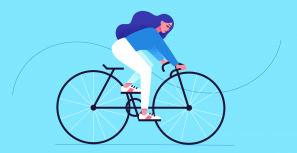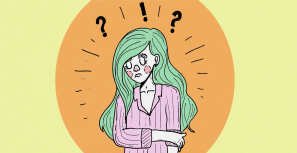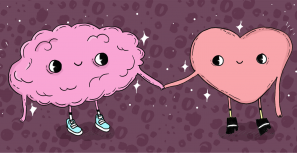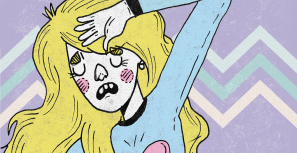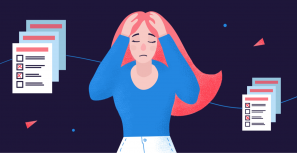Anxiety is often a long-term issue. To keep anxiety from coming back, you need to learn to control your overall anxiety symptoms, and that's not something that happens overnight. There is no magic pill for curing anxiety forever, nor is there a therapy that is 100% effective after one session.
But when you're suffering from anxiety,you want to feel better fast. No one wants to sit back and wait hours and hours for their anxiety to go away, especially if you're dealing with anxiety during an interview, or in an uncomfortable situation, or before sleep. These are all situations where you need rapid help to control your anxiety. Below are some potential fast anxiety reduction strategies.
Anxiety Disorders vs. Nervousness
The first thing to recognize is whether you're suffering from severe anxiety or simply standard nervousness. There is a key difference between an anxiety disorder and feeling nervous in a "normal" situation.
There is "normal" nervousness. For example, if you're about to go on an interview, or a first date, or your boss has called you in for a reprimand, some nervousness is completely normal, and you're not suffering from an anxiety disorder necessarily - you're just dealing with the standard stresses of life.
Other times you may be suffering from an anxiety disorder. If you have anxiety attacks or feel anxious all the time, you may have anxiety that needs a more long-term cure. This may change the treatment recommendations because that type of anxiety requires long-term solutions. Still, consider the following tips to relieve anxiety rapidly.
Drugs for Fast Anxiety Relief
There are no safe drugs to cure anxiety fast, because drugs themselves require a prescription, interact with other medications, and often need to be taken as long as an entire year to be effective. There are some herbal supplements that may be effective. These include:
- Kava
- Valerian Root
- Passionflower
Those three are the most effective herbs for relieving anxiety. It's still generally recommended to talk to a doctor before taking any supplements, no matter how safe, because they can interact with other medications. They should also never be taken with alcohol or with any other self-treatment. But those three are the most common herbs for relieving the anxiety experience.
Strategies to Reduce Situational Nervousness
If you find yourself nervous in a specific situation, you'll find it's a bit harder to calm your nerves quickly. By specific situation, we're talking about things like:
- A blind date.
- A public speaking engagement.
- A big test in class.
Anything that would invoke some nervousness or fear, but may not be traditionally associated with an anxiety disorder. It can be hard to calm your body fast enough because the anxiety itself can serve a function. It's telling you that you're doing something that you find frightening in some way, and your body is reacting to make sure you're aware of what you're doing.
But obviously it can be problematic as well, especially because the anxiety can feel uncontrollable and may not be suitable for your situation. You don't want to be overly nervous on a first date, or nervous public speaking, etc., so fast ways to reduce anxiety are important.
Consider the following:
- Go JoggingJogging isn't just important for becoming fit. Jogging is a known stress reducer that is believed to be as powerful as some anxiety medications. Extended jogging releases chemicals in your brain that soothe mood, tires muscles to prevent nervous tension, and burns away the stress hormone cortisol that contributes to many stress symptoms.
- Write in a JournalYou may find that what's causing you the most stress is a nagging thought - especially if you're trying to go to sleep or you're worried about a meeting with a boss. Nagging thoughts have a tendency to linger and cause further anxiety. Writing it down in some type of book essentially tells your brain it can stop obsessing over it because it's in a permanent place.
- Progressive Muscle RelaxationIt's not the best tool for nervous sweating, but it is a great tool for feeling calmer. Stand up straight, and tense each muscle one at a time for 10 seconds then release, starting at your right foot and moving all the way up to your face. You should tense until you feel a slightly “burning” sensation, but not so much as to be painful. Tensing and releasing relaxes the muscle and focuses the mind, which can decreases the feeling of nervousness and anxiousness.
- Positive AffirmationsPositive affirmations are an unusual strategy that is more effective than people give it credit for. Affirmations are essentially repeating to yourself positive phrases (or writing them out if you find that more soothing). There are two aspects of positive affirmations that are effective. First, it focuses your mind on something positive. Second, it gives you a healthy distraction so that you stop focusing on the stressors.
- Embrace the Nervousness减少焦虑的理论依据the practice of "mindfulness." Many find that accepting an emotion is more effective than fighting it. If you find yourself nervous, recognise that this is what you are feeling and let it be, rather than try to fight it and find ways not to be nervous. This won't reduce the initial nervousness, but it will stop you from feeling additional stress or anxiety because you're nervous (many people find they get into an anxiety loop - feeling anxious because they're stressed that they feel anxious).
Nervousness in some situations can also be preventable. For example, if you find you're often nervous when speaking to a stranger in a bar or club, a solution to control that nervousness in the future is to head to a bar or club and purposely embarrass yourself as much as possible. This type of behavior prepares you for the experience of embarrassment and helps you learn that the consequences are likely not as severe as you expect.
它可以很难找到即时救济的情形nal nervousness since your mind and body are reacting in a healthy way to things you find fearful. Ideally, you'll want to find ways to make these activities less fearful in the future.
How to Prevent a Severe Anxiety Attack
Not all anxiety is just general nervousness. Some people experience severe anxiety attacks. Also known as panic attacks, these are bouts of what can feel like uncontrollable, severe anxiety that are usually followed by other physical symptoms like rapid heartbeat, chest pain, lightheadedness, and more.
Anxiety attacks often peak after about 10 minutes and then there is a slow but clear decline in the anxiety symptoms, usually followed by a feeling of being drained or stressed. Many people wonder how to stop panic attacks from getting out of control. It's difficult to stop the attack itself, but there are some fast ways to prevent the attack from being as severe. These include:
- Breathing ExercisesMany of the worst panic attack symptoms come from poor breathing. There are several breathing exercises designed to get your breathing under control. One involves closing your eyes and imagine you're trying to blow on a candle. Your goal is not to blow the flame out, but rather to blow it softly enough that it flickers without blowing out.
- Call/Tell SomeoneOne of the issues that makes panic attacks more severe is getting stuck in your own head with your own thoughts. If you have a friend with you, tell them what you're feeling and talk to them. If you have someone to call, call them and tell them about it. These also serve as sufficient distractions to make panic attacks less severe.
- Walk AroundIt's also important that you try to get up and walk around. Walking provides visual stimulation and improves blood and air flow. Running is ideal, but many people find it very hard to run during a panic attack so it's not recommended.
These won't stop the panic attack altogether - for that you need panic attack treatments - but they will reduce the severity of the panic attack, and an anxiety attack that is less severe is generally easier to cope with.
How to Reduce Anxiety in the Long Term
If you find that you're often suffering from anxiety and nervousness, even when you're not in a situation that typically cause that level of anxiety, you may be suffering from an anxiety disorder. Anxiety disorders cannot be cured overnight but many people do improve. They're the result of years of experiences, and they take time to heal.
The fastest way to reduce anxiety is to first identify what you're experiencing, and then use step by step methods to move forward.




